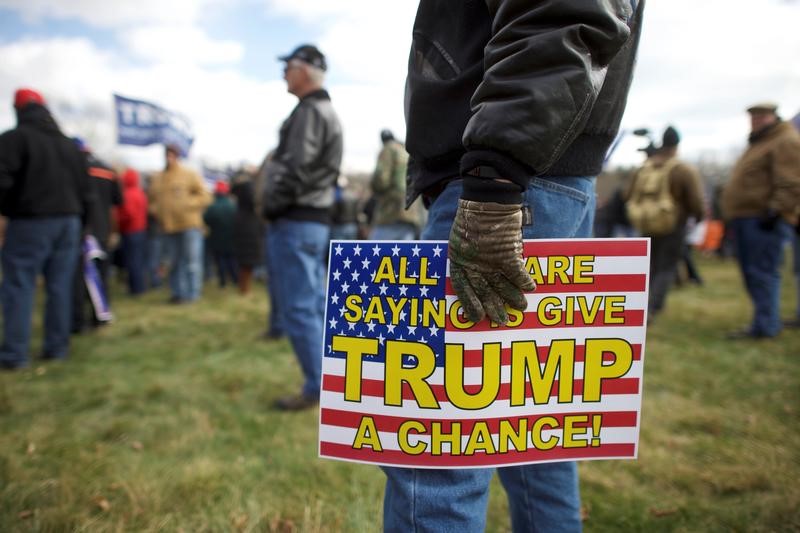By John Whitesides
WASHINGTON (Reuters) - In Washington, the chatter about a deepening, Watergate-style crisis has engulfed the White House - and those conversations are echoed in big cities across the country and in a succession of headlines that seem to suggest almost certain doom for the young Trump administration.
But for many Americans, including President Donald Trump’s staunchest supporters, the "crisis in Washington" is not about possible missteps by Trump or questions over whether his campaign colluded with Russia. For them, it’s the latest egregious example of mainstream media bias and of Washington insiders desperate to preserve their status taking revenge on the New York celebrity businessman.
In such an intensely polarized political environment that distrust of mainstream media will make it less likely that Trump supporters - and the Republican officeholders who rely on their votes - will abandon the president any time soon.
"The more negativity, the more we're for him. It's backfiring on them," Arizona resident Nadia Larsen said of media reports about possible collusion with Russia or Trump’s conversations with then-FBI Director James Comey.
Reports from the Washington Post and New York Times that Trump shared classified information with Russia’s foreign minister and pressured Comey to end an inquiry into former national security adviser Michael Flynn have been met with skepticism by Larsen and many other Trump supporters.
More credible, they say, is news from prominent conservative media outlets, from the Trump-friendly airwaves of Fox News to websites such as Breitbart. Those outlets have cast the allegations as an ideological attack by Obama administration holdovers or the revenge of the "deep state," a term used by the far right to refer to what they see as a deeply entrenched bureaucracy opposed to Trump.
"The only news I watch is Fox, but the only news I watch and believe is whatever comes out of the president's mouth and whatever he tweets," said Larsen, an Israeli-born immigrant who has lived in Tucson, Arizona, for 25 years.
Several Trump supporters decried what they described as baseless news from anonymous sources and said they have not seen any concrete evidence to support the allegations against Trump.
"This is what I expected," said Jeff Klusmeier, an insurance agent in Louisville, Kentucky. "I expected the media to attack Trump. I expected the Democrats to attack him and call for impeachment. So it's par for the course for me."
Conservative media outlets have developed their own theories about the recent spate of negative headlines. The Breitbart News Network, once headed by Trump chief strategist Stephen Bannon, reported that some of the recent accusations were driven by associates of Comey, who was fired by Trump last week, in a story headlined "Comey Strikes Back."
Among the headlines on the Drudge Report, a popular conservative news aggregator, were "Media Reach Peak Meltdown" and "Sabotage in DC."
"The anti-Trump press believes it smells blood in the water," said Fox News commentator Sean Hannity, a staunch Trump supporter who accused the mainstream media of "hyperventilating breathlessness."
Hannity tweeted on Wednesday that five groups were trying to destroy Trump: the media, Democrats, deep state/intelligence operatives, establishment Republicans and "never Trumpers."
'WITCH HUNT'
"This effort, this plan, this desire to upend and stop the Trump presidency got going probably on election night and certainly within 24 hours. And now we're seeing it manifest itself," radio talk-show host Rush Limbaugh said.
On Wednesday, the Justice Department appointed former FBI head Robert Mueller as a special counsel to investigate possible ties between Trump's 2016 presidential campaign and Russia.
Trump has fed the theory that the media is out to get him, saying "no politician in history" has been treated more unfairly. On Thursday he tweeted that the probe of Russian collusion was "the single greatest witch hunt" in U.S. history.
"The overwhelming majority of conservatives and Republicans believe that whatever you may think of Donald Trump, this is clearly being driven by many quarters of the media that chose sides in the election and were very upfront about it and haven't changed," Republican consultant Keith Appell told Reuters.
Trump's approval ratings have been low for a new president, remaining mired in the high 30s to low 40s. But 77 percent of Republicans approve of Trump's performance, according to the most recent Reuters/Ipsos survey, a figure that has stayed relatively steady since his inauguration.
Bradd Bostick, a Reynoldsburg, Ohio, resident who started a Bikers for Trump group after the president's inauguration in January, said he was not concerned about the recent controversies because "most of us do not believe anything we hear in the mainstream media."

"The media thinks it's about Trump, and it's not," said Steve Deace, an Iowa-based commentator for Conservative Review and a former talk-radio host who has been critical of Trump. "It's not about Trump's credibility, it's about the media's credibility."